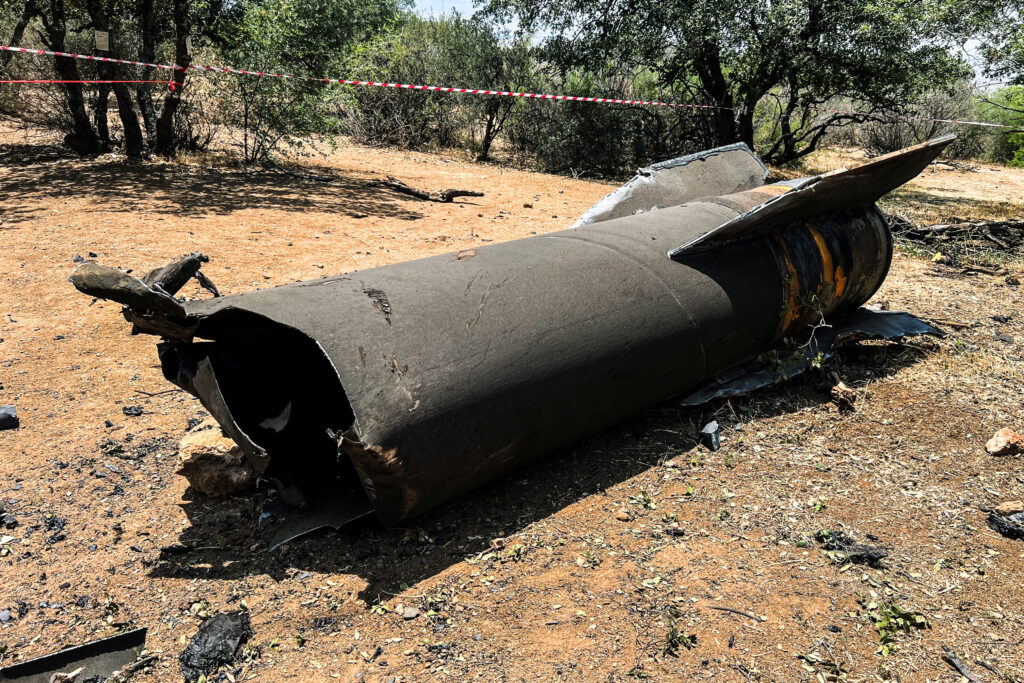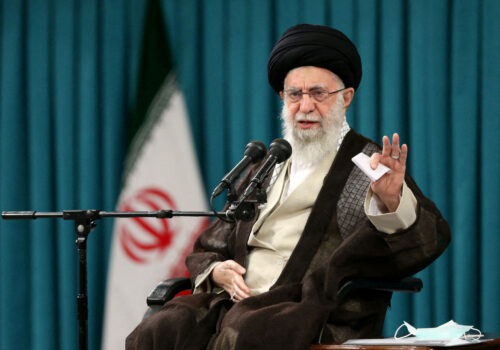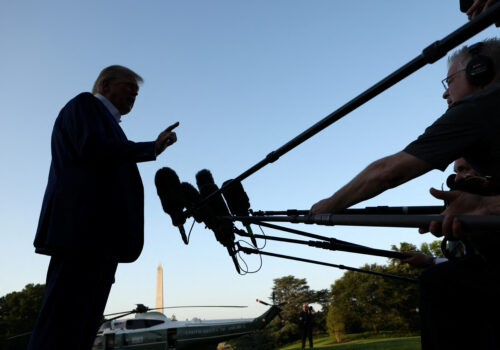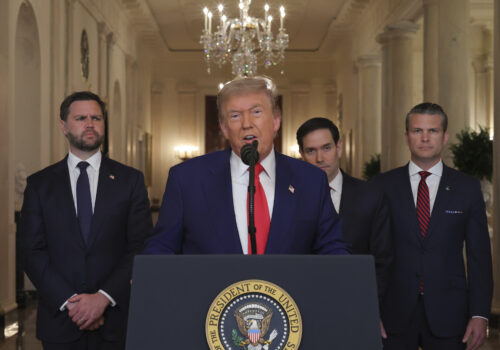GET UP TO SPEED
Is this the end, the beginning of the end, or something else? A tentative cease-fire is underway in the war between Iran and Israel, after the combatants got in some last punches on Tuesday. US President Donald Trump declared a conclusion to what he called the “12 Day War” less than a day after Iran retaliated against the US bombing of its nuclear facilities with a strike against a US military base in Qatar. We asked our experts what the past twelve days have revealed about Iran, Israel, and the United States.
TODAY’S EXPERT REACTION BROUGHT TO YOU BY
- Jonathan Panikoff (@jpanikoff): Director of the Council’s Scowcroft Middle East Security Initiative and former US deputy national intelligence officer for the Near East
- Daniel B. Shapiro (@DanielBShapiro): Distinguished fellow with the Atlantic Council’s Scowcroft Middle East Security Initiative and former US ambassador to Israel
- Kirsten Fontenrose: Nonresident senior fellow at the Scowcroft Middle East Security Initiative and former senior director for the Gulf at the US National Security Council
Iran
- “The balance of power in the region has been fundamentally altered,” Jonathan tells us. “For years, Iran’s power projections were predicated on a triad of capabilities: its proxy network, ballistic missiles, and nuclear program. All three have been severely diminished.”
- The war has demonstrated Iran’s “devastating weakness and vulnerability to penetration,” Dan argues, adding that Iran’s nuclear program has been “significantly disrupted and set back.” However, this is “probably not the end of the program, and certainly not the end” of Iran’s aspirations to acquire nuclear weapons.
- Now, Dan says, the United States should work with Gulf and European countries to “try to return to negotiations” on a deal that would prevent Iran from enriching any uranium, “offering some degree of sanctions relief that Iranian leaders, intent on stabilizing their regime, can offer as a win to their people.”
Sign up to receive rapid insight in your inbox from Atlantic Council experts on global events as they unfold.
Israel
- “Israel emerges from this conflict with its reputation as a fearsome military enhanced,” says Dan, as Jerusalem has demonstrated “its ability to project power and harm its enemies across the Middle East,” as well as its unwillingness after Hamas’s October 7 attack to “live in the shadow of existential threats.”
- Israel achieved its two main objectives in the war, argues Jonathan, which were to “significantly set back” Iran’s ballistic missile capabilities and nuclear program. “Regardless of whether Israel had to act when it did,” Jonathan says, “Iran’s nuclear program is clearly no longer an immediate existential threat to Israel” in being, by Israeli estimates, only weeks away from producing nuclear weapons.
- But Dan warns that Israel must “guard against hubris” given that it sustained “significant hits and casualties” from Iran’s ballistic missiles, which strained Israeli air defenses. “Israel’s leaders should try to capitalize on this moment,” says Dan, “to reach a final cease-fire and hostage deal that ends the war in Gaza, brings all hostages home, and removes Hamas from power.” This could help “get the region back on the path of greater integration.”
- The conflict revealed a rift in US and Israeli objectives in striking Iran, notes Kirsten. While both the United States and Israel targeted Iran’s nuclear program, some Israeli leaders described a broader objective: “to prevent Iran from posing an existential threat, which many interpret as requiring the takedown of a regime committed to the destruction of Israel.”
The United States
- “The US military demonstrated its unique capabilities,” Dan tells us, “executing the strikes on Iran’s nuclear facilities, deterring Iran from a meaningful response, and protecting US assets and personnel with skill and precision.” However, he notes that “vigilance will be required” if Iran or its proxies attempt to “settle scores down the line.”
- The operation to evacuate US and Qatari forces from the Al Udeid base before it was struck by Iran was “a feat of bilateral logistics coordination,” Kirsten notes. The Iranian attack could bring Qatar, which strikes a diplomatic balance between Washington and Tehran, “firmly in the US camp.”
- Even after the successful US strike against Fordow, says Jonathan, the question remains whether Iran removed a significant amount of highly enriched uranium from the nuclear facility before it was struck. If it did so, it would only require a few hundred advanced centrifuges plus an Iranian stockpile of uranium enriched to 60 percent at a small facility to get to weapons-grade material, he estimates.
- Answering that question likely will require deploying International Atomic Energy Agency inspectors to Iran to assess the damage, Jonathan adds, so “a diplomatic long-term solution that addresses any future Iranian nuclear program is still required.” Otherwise, in several months “US or Israeli strikes could be once more required” to prevent the scenario that prompted this war in the first place: Iran acquiring nuclear weapons.
Further reading
Sun, Jun 22, 2025
Trump made the right call. Will Khamenei do the same?
New Atlanticist By William F. Wechsler
The Iranian regime is in a fundamentally weak position, and it should leap at this last opportunity to save itself.
Tue, Jun 24, 2025
Dispatch from The Hague: How Trump can build on his Middle East success with NATO
Inflection Points By Frederick Kempe
As the Alliance summit begins, the US president can already justifiably trumpet three major achievements in the Middle East. Will he add one more in Europe?
Sat, Jun 21, 2025
Experts react: The United States just bombed Iran’s nuclear sites. Here’s what to expect next.
New Atlanticist By
Early on Sunday morning in the Middle East, US forces targeted Fordow, Natanz, and Isfahan. Atlantic Council experts survey the fallout for Iran and for the region.
Image: Remains of a ballistic missile lie on the ground following missile attacks by Iran on Israel, amid the Iran-Israel conflict, in northern Israel, June 23, 2025. REUTERS/Avi Ohayon



